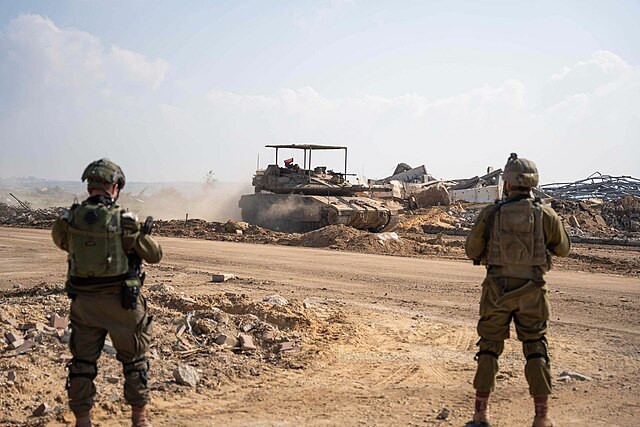In a devastating series of attacks, at least 25 people were killed and dozens more injured in the fourth strike on or near a school in Gaza within the past four days. The latest incident occurred at the Al-Awda school in Abasan, a city in southern Gaza's Khan Younis governorate, where witnesses reported a scene of chaos as people gathered outside the school to watch a soccer match when the strike hit.
Footage authenticated by NBC News showed a game being played in the school's courtyard before a blast rang out, sending people dashing in all directions amidst screams. NBC News crews on the scene filmed the harrowing aftermath, with bloodied patients, including young children, filling the hallways of local hospitals. Many were seen lying on the ground, wailing in pain.
Ahmed Wessam Kediah, a 14-year-old boy who was injured in the blast, recounted his terrifying experience from his stretcher. "I was walking when suddenly I found myself flying," he said, his leg wrapped in bandages. "I saw all the wounded. Just body parts."
The strike on Al-Awda school has drawn significant condemnation. The Israel Defense Forces (IDF) stated that they had targeted a Hamas fighter involved in the Oct. 7 attack on Israel. They acknowledged the proximity of the school to the strike location and indicated they were investigating reports of civilian casualties.
Hamas quickly condemned the strike, warning that continued Israeli attacks could jeopardize ongoing cease-fire negotiations being mediated in Doha, Qatar. The talks aim to end nearly nine months of conflict in Gaza, which local health officials say has resulted in over 38,000 deaths.
Philippe Lazzarini, commissioner-general of the United Nations' Palestinian refugee agency (UNRWA), highlighted the severity of the situation, stating that at least four schools had been hit in the last four days. "Schools have gone from safe places of education & hope for children to overcrowded shelters and often ending up a place of death & misery," he wrote on X.
Among the recent strikes, an UNRWA-run school in Nuseirat was hit, killing at least 16 people. Another strike targeted the Holy Family school in Gaza City, a place of refuge for hundreds of civilians. A subsequent strike hit another UNRWA school in Nuseirat. The IDF has maintained that these locations were being used by Hamas for military purposes, an allegation that Hamas denies.
The escalating violence has exacerbated an already dire humanitarian crisis in Gaza. A group of U.N.-mandated independent human rights experts warned of a spreading famine in the enclave. At least three children have reportedly died of malnutrition in the central Gaza areas of Khan Younis and Deir Al-Balah since May. "With the death of these children from starvation despite medical treatment in central Gaza, there is no doubt that famine has spread from northern Gaza into central and southern Gaza," the group stated.
As the conflict rages on, the Israeli military has ordered the evacuation of Gaza City, pressing ahead with a new offensive that has killed dozens over the past 48 hours. The military urged residents to flee south, promising safe passage along specified routes. However, many Palestinians are skeptical, fearing arrest or harassment at checkpoints.
The humanitarian toll continues to rise, with over 38,200 people killed and more than 88,000 wounded in Gaza, according to the territory's Health Ministry. Nearly the entire population has been displaced, many multiple times, with hundreds of thousands now living in squalid conditions.
International efforts to negotiate a cease-fire are intensifying. U.S., Egyptian, and Qatari mediators are engaged in talks with Israeli officials in Doha. While a potential deal to end hostilities and secure the release of hostages appears within reach, significant obstacles remain. Hamas has accused Israeli Prime Minister Benjamin Netanyahu of placing hurdles in the way of a cease-fire, even as both sides narrow the gaps in negotiations.
Despite widespread support for a cease-fire among Israelis, with over 85% favoring a deal according to a poll by the Israel Democracy Institute, far-right Israeli politicians remain opposed. Finance Minister Bezalel Smotrich and National Security Minister Itamar Ben-Gvir have voiced strong resistance, complicating Netanyahu's position.






